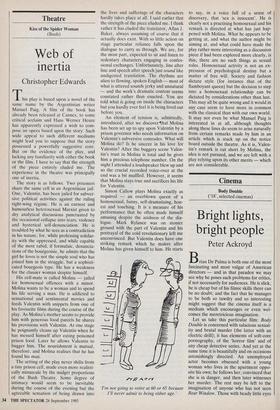Theatre
Kiss of the Spider Woman (Bush)
Web of inertia
Christopher Edwards
This play is based upon a novel of the same name by the Argentinian writer Manuel Puig. A film of the book has already been released at Cannes, to some critical acclaim and Hans Werner Henze has apparently expressed a wish to com- pose an opera based upon the story. Such wide appeal to such different mediums might lead you to suppose that the story possessed a powerfully suggestive core. But on the evidence of the play, and lacking any familiarity with either the book or the film, I have to say that the strength of the piece entirely eluded me. The experience in the theatre was principally one of inertia.
The story is as follows. Two prisoners share the same cell in an Argentinian jail. One, Valentin, has been jailed for subver- sive political activities against the ruling right-wing regime. He is an earnest and humourless heterosexual Marxist given to dry analytical discussions punctuated by the occasional collapse into tears, violence and hysterical self-denunciation. He is troubled by what he sees as a contradiction in his nature, for, while professing solidar- ity with the oppressed, and while capable of the most rabid, if formulaic, denuncia- tions of the bourgeoisie, he admits that the girl he loves is not the simple soul who has joined him in the struggle, but a sophisti- cated bourgeois type. He has a weakness for the classier woman despite himself.
His cell-mate is called Molina — jailed for homosexual offences with a minor. Molina wants to be a woman and to spend his life serving a man. He is addicted to sensational and sentimental movies and feeds Valentin with snippets from one of his favourite films during the course of the play. As Molina's mother seems to provide him with generous food parcels he shares his provisions with Valentin. At one stage he poignantly cleans up Valentin when he has messed himself after eating poisoned prison food. Later he allows Valentin to bugger him. The nourishment is mutual, therefore, and Molina realises that he has found his man.
The setting of the play never shifts from a tiny prison cell, made even more realisti- cally minuscule by the midget proportions of the Bush Theatre. Some degree of intimacy would seem to be inevitable during the course of the evening but the agreeable sensation of being drawn into the lives and sufferings of the characters hardly takes place at all. I said earlier that the strength of the piece eluded me. I think rather it has eluded the translator, Allan J. Baker, always assuming of course that it actually does exist. With so little action on stage particular reliance falls upon the dialogue to carry us through. We are, for the most part, expected to sit and listen to sedentary characters engaging in confes- sional exchanges. Unfortunately, line after line and speech after speech just sound like undigested translation. The rhythms are alien to flowing, spoken English — most of what is uttered sounds jerky and unnatural — and the work's dramatic content seems constated rather than enacted. You are told what is going on inside the characters but you hardly ever feel it is being lived out before you.
An element of tension is, admittedly, introduced, after we discover 'that Molina has been set up to spy upon Valentin by a prison governor who needs information on Valentin's subversive comrades. What will Molina do? Is he sincere in his love for Valentin? After the buggery scene Valen- tin's trust in Molina is total and he gives him a precious telephone number. On the night I attended a loudspeaker blew up and so the crucial recorded voice-over at the end was a bit muffled. However, it seems that Molina stays true and sacrifices his life for Valentin.
Simon Callow plays Molina exactly as required — an overblown queen of a homosexual, funny, self-dramatising, hon- est and touching. It is a measure of his performance that he often made himself amusing despite the aridness of the dia- logue. Mark Rylance was on stonier ground with the part of Valentin and his portrayal of the cold revolutionary left me unconvinced. But Valentin does have one striking remark which he makes after Molina has given himself to him. He starts 'I'm not going to retire at 60 or 65 because I'll never admit to being either age.' to say, in a voice full of a sense of discovery, that 'sex is innocent'. He is clearly not a practising homosexual and his remark is directed at what has just hap- pened with Molina. What he appears to be getting at, and what the author might be aiming at, and what could have made the play rather more interesting as a discussion piece if had been explored more clearly, is this; there are no such things as sexual roles. Homosexual activity is not an ex- pression of psychological destiny but a matter of free will. Society and fashion dictate style (for instance that of the flamboyant queen) but the decision to step into a homosexual relationship can be dictated by considerations other than lust. This may all be quite wrong and it would in any case seem to have more in common with the classical than with our own world. It may not even be what Manuel Puig is interested in at all, although thoughts along these lines do seem to arise naturally from certain remarks made by him in an article which is stuck up on the notice board outside the theatre. As it is, Valen- tin's remark is cut short by Molina, the idea is not pursued, and we are left with a play relying upon its other merits — which are not considerable.














































 Previous page
Previous page